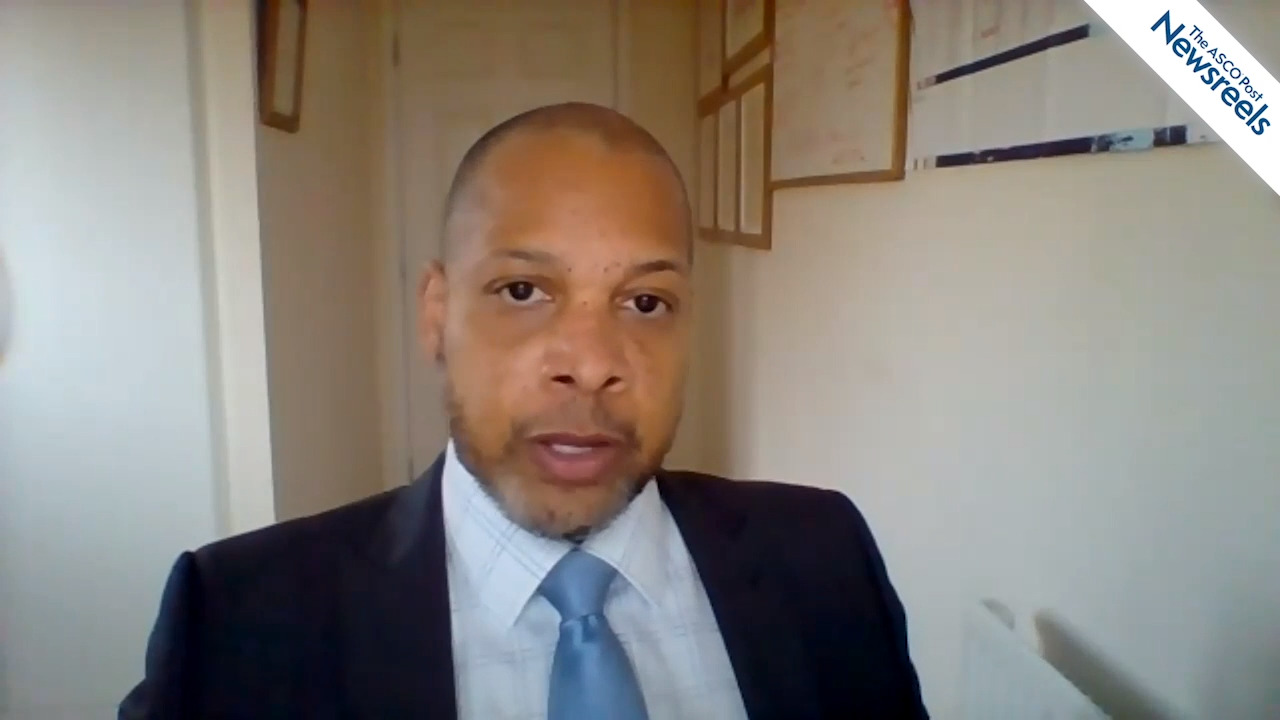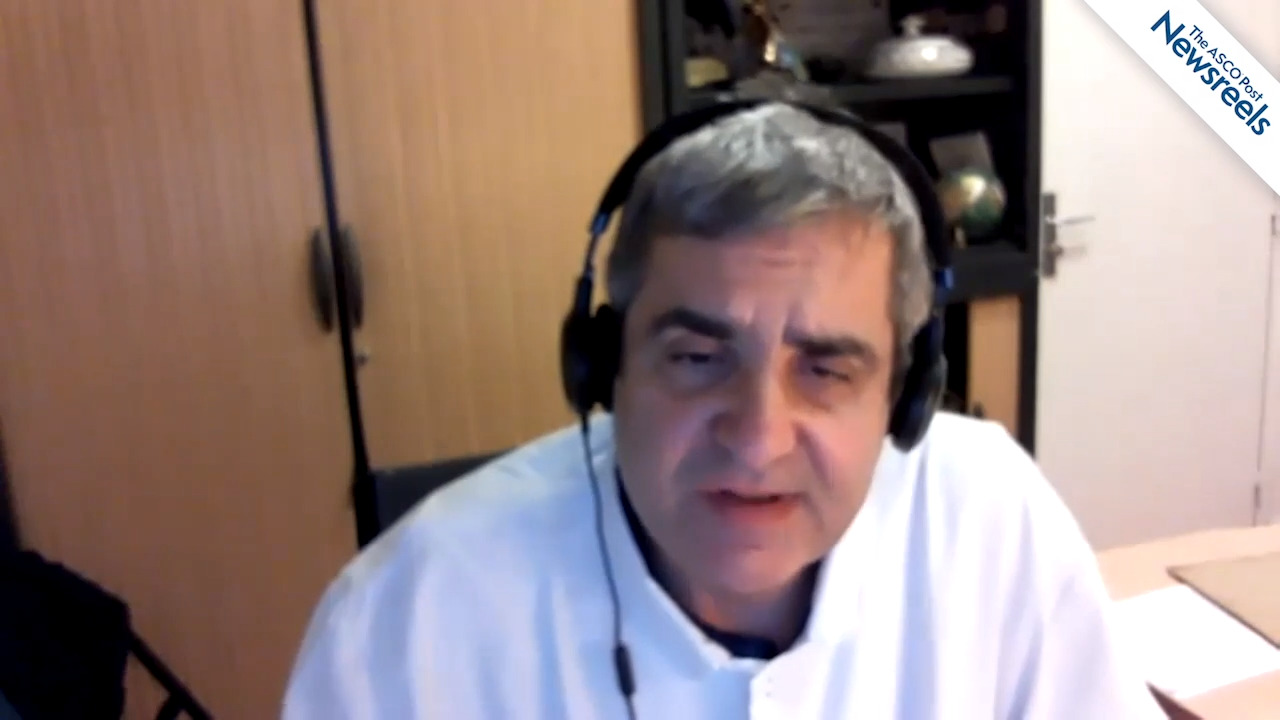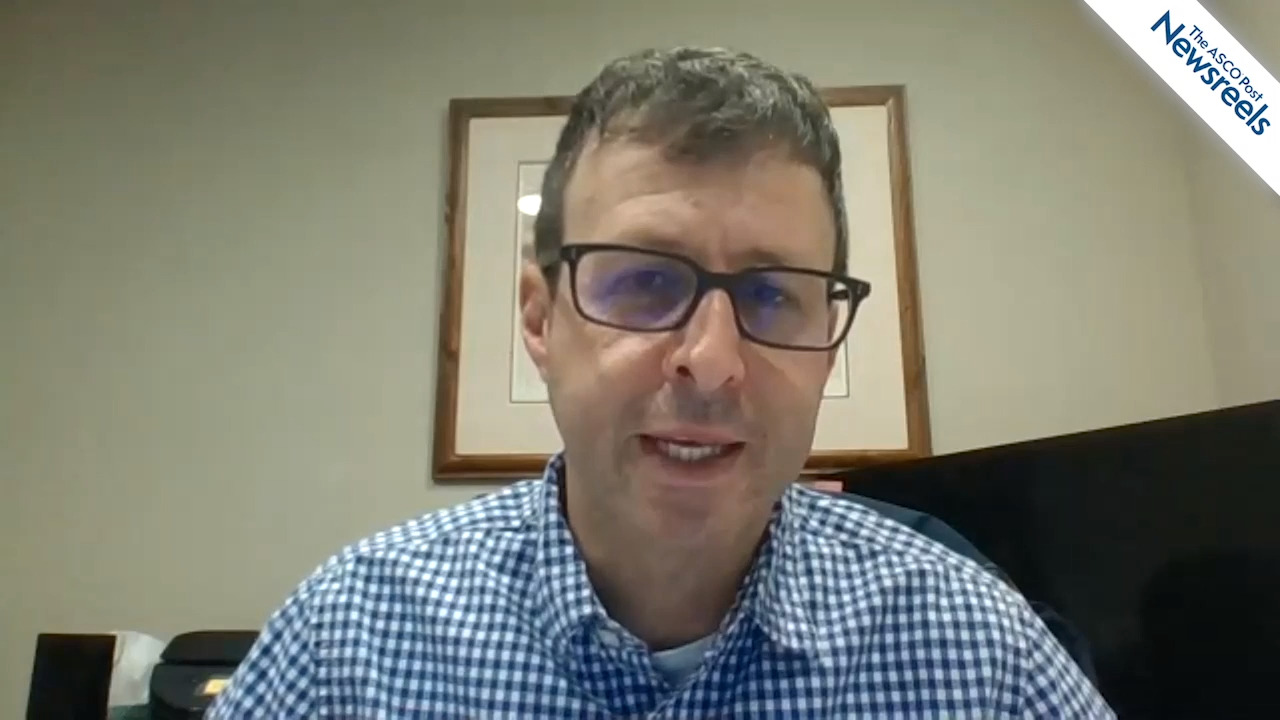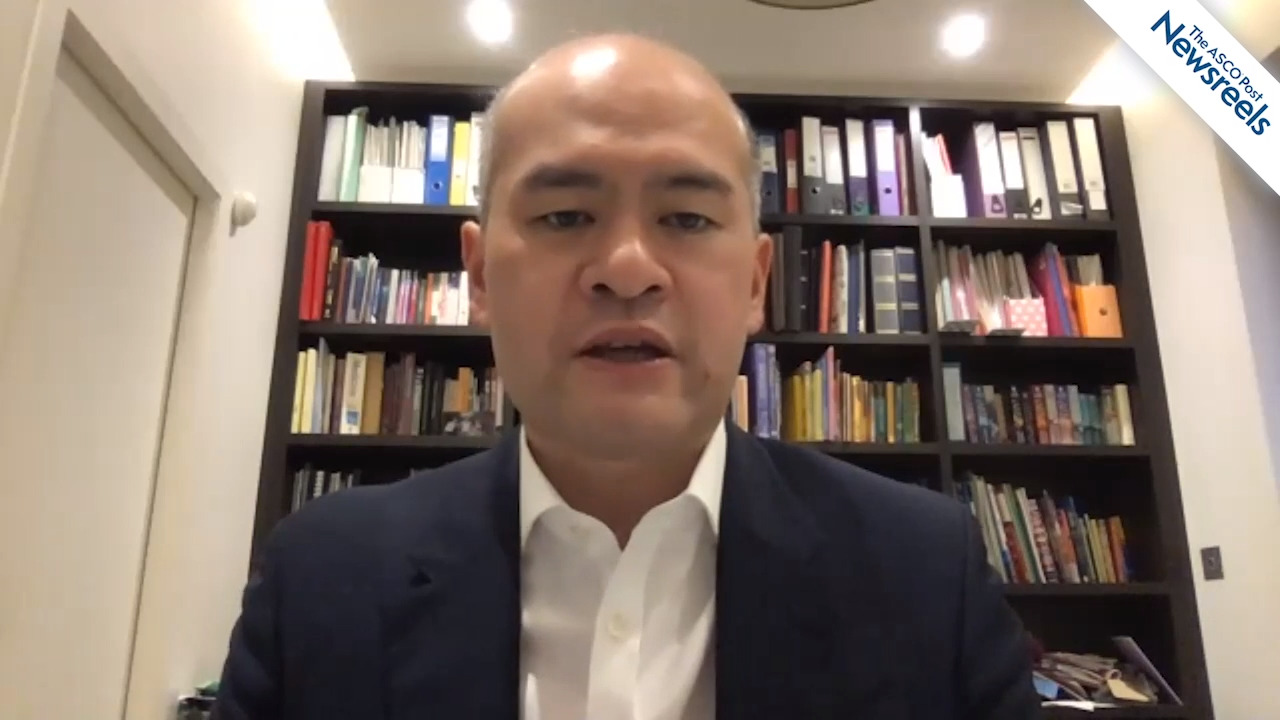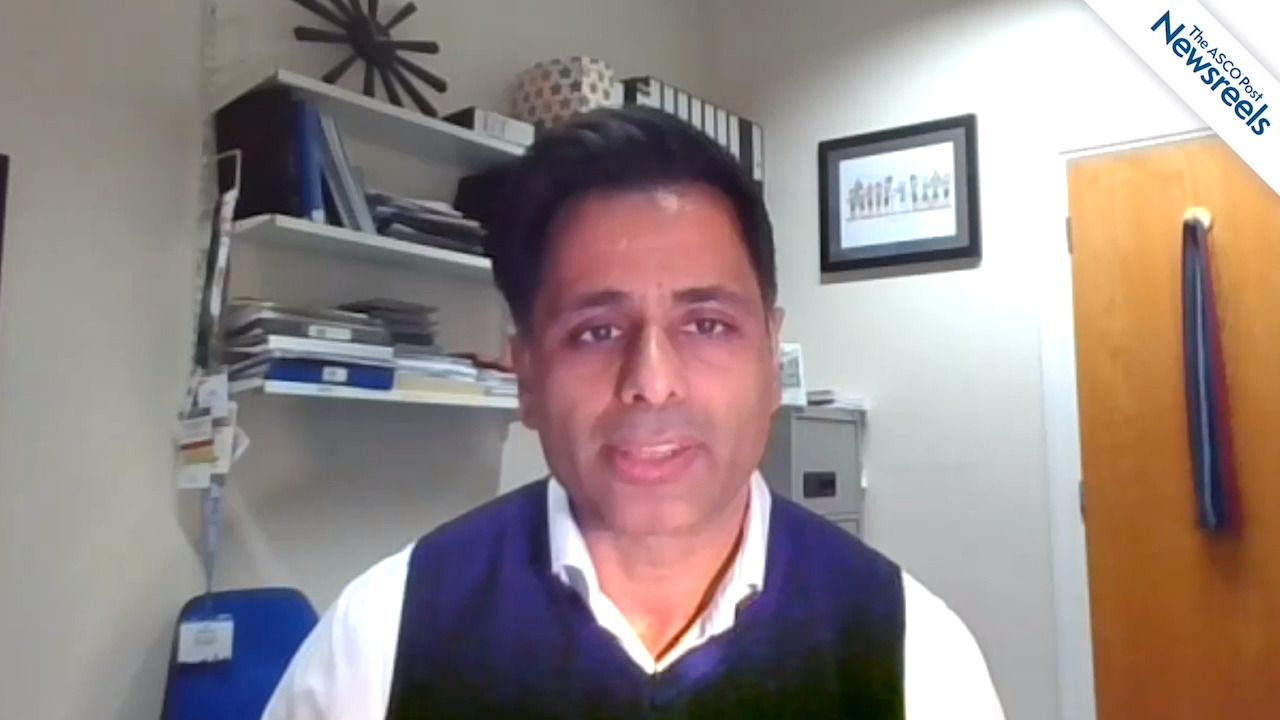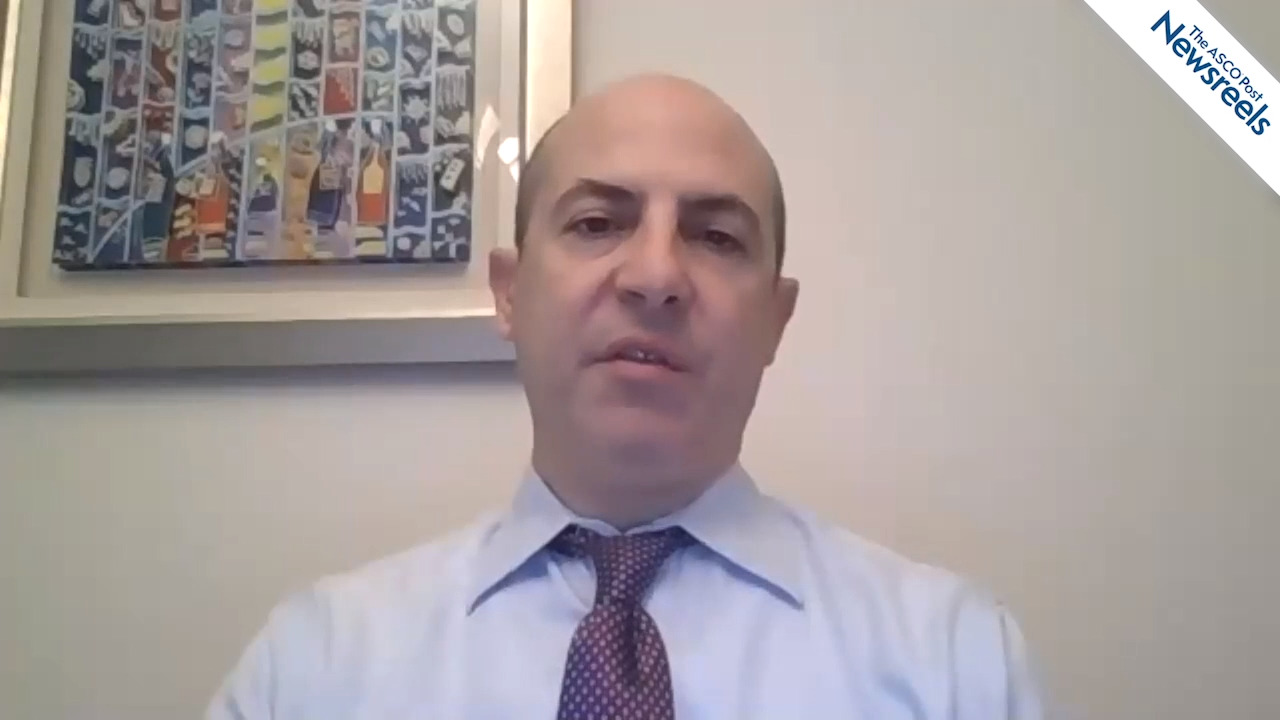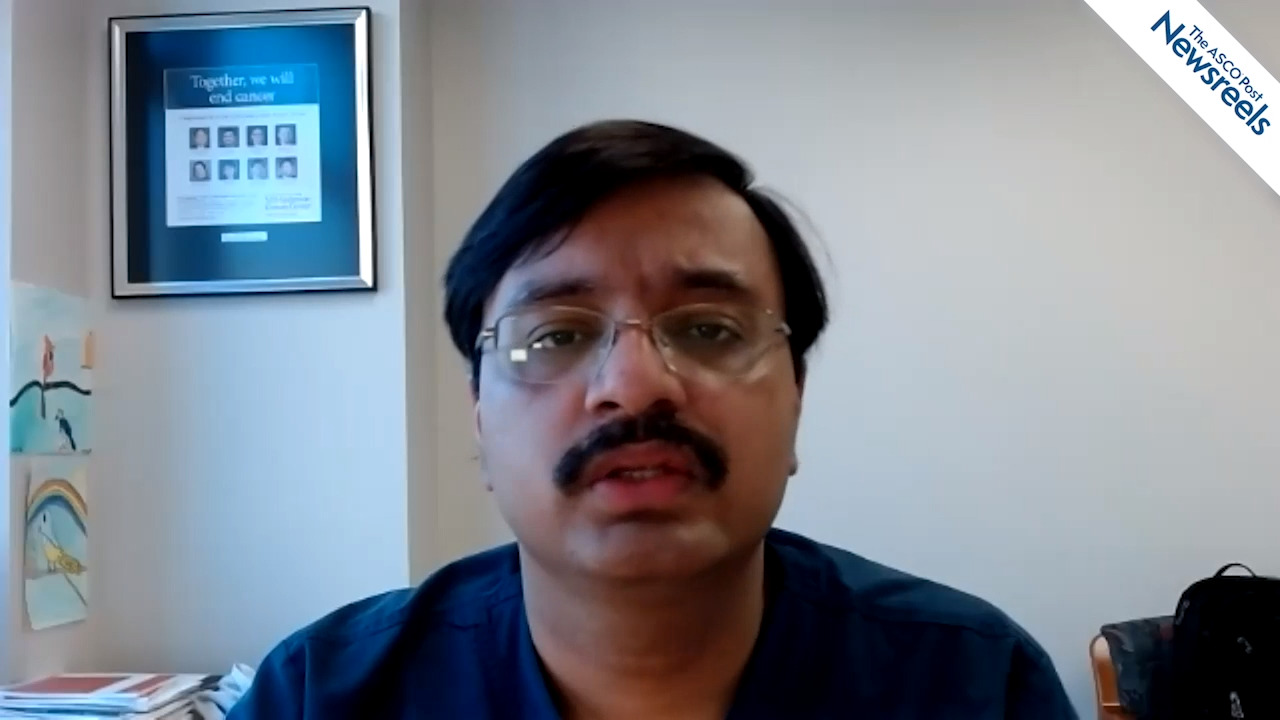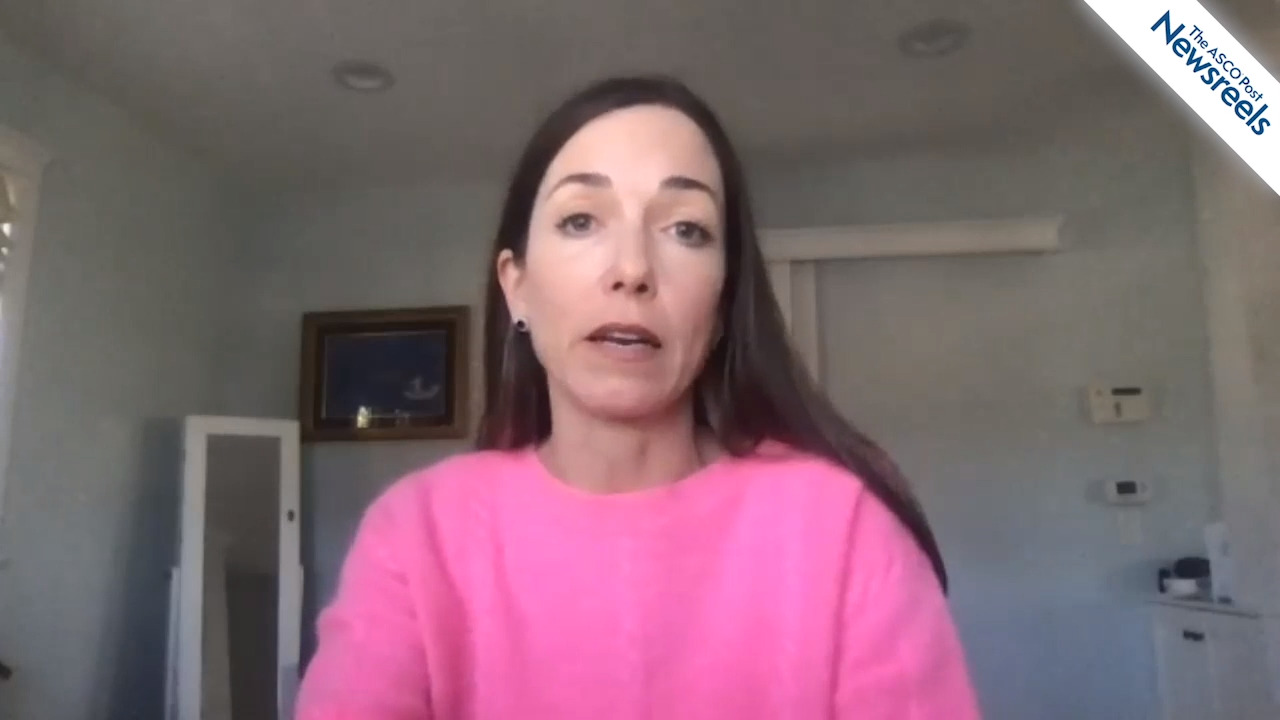Dean Fennell, FRCP, PhD, on Mesothelioma: Nivolumab vs Placebo in Relapsed Disease
Dean Fennell, FRCP, PhD, of the University of Leicester, discusses phase III results from the CONFIRM trial, which sought a standard immunotherapy treatment to improve overall survival for patients with mesothelioma who have relapsed after taking pemetrexed and cisplatin. Globally, the incidence of mesothelioma is on the rise; in the United Kingdom alone, it has gone up nearly 500% since the 1970s (Abstract PS01.11).
Nivolumab Monotherapy Improves Survival in Patients With Relapsed Malignant Mesothelioma
In patients with relapsed malignant mesothelioma, treatment with single-agent nivolumab led to a significant improvement in both overall and progression-free survival in the phase III CONFIRM trial. These findings were presented by Dean A. Fennell, FRCP, PhD, Professor and Chair of Thoracic Medical ...
LCMC3 Trial: Neoadjuvant Atezolizumab for Patients With Stage IB to IIIB Resectable Lung Cancer
Neoadjuvant treatment with single-agent atezolizumab for patients with stage IB to IIIB lung cancer resulted in a major pathologic response rate of 21% and pathologic complete response rate of 7% in the primary analysis of the Lung Cancer Mutation Consortium 3 (LCMC3) study. The findings were...
Negative Findings in KEYNOTE-598: Ipilimumab Adds No Benefit to Pembrolizumab as First-Line Therapy for NSCLC With High PD-L1 Expression
In the phase III KEYNOTE-598 study, the addition of ipilimumab to pembrolizumab increased toxicity without boosting efficacy as first-line therapy for metastatic non–small cell lung cancer (NSCLC) in patients with high expression of PD-L1, according to research presented at International...
CheckMate 9LA Trial: First-Line Nivolumab/Ipilimumab Plus Chemotherapy vs Chemotherapy Alone in Stage IV or Recurrent NSCLC
As reported in The Lancet Oncology by Luis Paz-Ares, MD, and colleagues, the phase III CheckMate 9LA trial has shown improved overall survival with first-line nivolumab/ipilimumab plus two cycles of chemotherapy vs four cycles of chemotherapy alone in patients with stage IV or recurrent non–small...
FDA Pipeline: Priority Reviews for Immunotherapies in Gastric Cancers, Anal Cancer
The U.S. Food and Drug Administration (FDA) recently granted Priority Review to nivolumab as either adjuvant or first-line therapy in several types of gastric cancers, as well as to a novel PD-1 inhibitor for locally advanced or metastatic squamous cell carcinoma of the anal canal. The FDA also...
Early Research Explores Relationship Between CD58 Loss and Resistance to CAR T-Cell Therapies
Engineering chimeric antigen receptor (CAR) T cells to overcome CD58 loss may be a way to boost responses in patients with diffuse large B-cell lymphoma (DLBCL) who do not respond to treatment with axicabtagene ciloleucel and other CAR T-cell therapies, according to an experimental study presented...
Addition of Vemurafenib to Irinotecan/Cetuximab in Previously Treated Patients With BRAF V600E–Mutant Metastatic Colorectal Cancer
In a phase II trial (SWOG S1406) reported in the Journal of Clinical Oncology, Scott Kopetz, MD, PhD, and colleagues found that the addition of vemurafenib to irinotecan and cetuximab significantly improved progression-free survival in previously treated patients with BRAF V600E–mutant metastatic...
Preemptive Tocilizumab for Cytokine-Release Syndrome in Pediatric Patients With B-Cell ALL Receiving CAR T-Cell Therapy
In a single-institution study reported in the Journal of Clinical Oncology, Kadauke et al found that risk-adapted tocilizumab reduced the expected incidence of grade 4 cytokine-release syndrome in pediatric patients receiving CD19-directed chimeric antigen receptor (CAR) T-cell...
Expert Point of View: Sagar Lonial, MD, and Adam D. Cohen, MD
The studies of ALLO-715 “off-the-shelf” CAR T-cell therapy and bb21217 impressed two experts in the field. Sagar Lonial, MD, the Anne and Bernard Gray Family Chair in Cancer, Chair and Professor of Hematology and Medical Oncology, Emory University School of Medicine, Atlanta, and Adam D. Cohen, MD, ...
Novel Anti-BCMA CAR T-Cell Therapies Show Activity in Myeloma
In the treatment of relapsed or refractory multiple myeloma, chimeric antigen receptor (CAR) T-cell therapies with unique characteristics, still targeting B-cell maturation antigen (BCMA), are looking promising. At the 2020 American Society of Hematology (ASH) Annual Meeting & Exposition,...
FDA Approves Nivolumab Plus Cabozantinib for Advanced Renal Cell Carcinoma
On January 22, the U.S. Food and Drug Administration (FDA) approved the combination of nivolumab (Opdivo) and cabozantinib (Cabometyx) as first-line treatment for patients with advanced renal cell carcinoma. CheckMate 9ER Efficacy was evaluated in CheckMate 9ER, a randomized, open-label trial in...
First-Line Nivolumab/Ipilimumab in Metastatic Uveal Melanoma
In a Spanish phase II trial reported in the Journal of Clinical Oncology, Piulats et al found that nivolumab/ipilimumab produced a “modest” improvement in overall survival vs historical rates achieved with chemotherapy as first-line treatment for patients with metastatic uveal melanoma ineligible...
Thierry André, MD, on Mismatch Repair–Deficient Solid Cancers: Safety and Efficacy of Dostarlimab
Thierry André, MD, of Hôpital Saint-Antoine, discusses results from the GARNET study, which showed that dostarlimab, an anti–PD-1 antibody, demonstrated durable antitumor activity in patients with mismatch repair–deficient colorectal and noncolorectal solid tumors. No new safety signals were detected, and most treatment-related adverse events were of a low grade (Abstract 9).
Richard S. Finn, MD, on HCC: Atezolizumab Plus Bevacizumab vs Sorafenib
Richard S. Finn, MD, of the UCLA Medical Center, discusses updated results from the IMbrave 150 study, which showed atezolizumab plus bevacizumab provides the longest overall survival seen in a front-line phase III study in advanced hepatocellular carcinoma, confirming this combination as the standard of care for patients with previously untreated, unresectable disease (Abstract 267).
Belantamab Mafodotin-blmf in Multiple Myeloma: Number of Prior Treatments No Hindrance to Efficacy
A post hoc analysis of the phase II DREAMM-2 trial showed single-agent belantamab mafodotin-blmf to be efficacious and tolerable in patients with relapsed or refractory multiple myeloma treated with at least three prior therapies, investigators reported at the 2020 American Society of Hematology...
Bemarituzumab Plus Chemotherapy Improves Outcomes in Advanced Gastric/Gastroesophageal Junction Cancer
Gastric cancer has a new target: fibroblast growth factor receptor 2b (FGFR2b). Targeting FGFR2b with bemarituzumab plus chemotherapy led to clinically meaningful and statistically significant improvements in progression-free survival, overall survival, and response rates in the randomized phase II ...
Kai-Keen Shiu, MD, PhD, on Colorectal Cancer: Pembrolizumab vs Chemotherapy for Microsatellite Instability–High Disease
Kai-Keen Shiu, MD, PhD, of the University College Hospital NHS Foundation Trust - London, discusses an interim analysis of PFS 2 results (defined as time from random assignment to progression on the next line of therapy or death) from the phase III KEYNOTE-177 trial. This study has already shown that first-line pembrolizumab provides a clinically meaningful and statistically significant improvement in PFS compared with chemotherapy in patients with microsatellite instability–high metastatic colorectal cancer (Abstract 6).
Wasat Mansoor, MBChB, PhD, on Esophageal Cancer: Quality of Life With Pembrolizumab and Chemotherapy
Wasat Mansoor, MBChB, PhD, of The Christie NHS Foundation Trust, discusses phase III results from the KEYNOTE-590 trial, which showed no deterioration in health-related quality of life when pembrolizumab was added to chemotherapy in patients with metastatic and unresectable esophageal cancers (Abstract 168).
Patients With Recurrent Glioblastoma and a Very Low Mutation Burden May Respond Best to Immunotherapy
A new study has found that patients with recurrent glioblastoma and a very low tumor mutation burden are more responsive to immunotherapies than similar tumors with an abundance of mutations. These findings, published by Gromeier et al in Nature Communications, could serve as a predictive biomarker ...
FDA Grants Accelerated Approval to Daratumumab Plus Hyaluronidase-fihj for Newly Diagnosed Light Chain Amyloidosis
On January 15, the U.S. Food and Drug Administration (FDA) granted accelerated approval to daratumumab plus hyaluronidase-fihj (Darzalex Faspro) in combination with bortezomib, cyclophosphamide, and dexamethasone for newly diagnosed light chain amyloidosis. ANDROMEDA Trial Efficacy was evaluated in ...
FDA Approves Fam-Trastuzumab Deruxtecan-nxki for Previously Treated Patients With HER2-Positive Gastric Cancers
On January 15, the U.S. Food and Drug Administration (FDA) approved fam-trastuzumab deruxtecan-nxki (Enhertu) for adult patients with locally advanced or metastatic HER2-positive gastric or gastroesophageal junction adenocarcinoma who have received a prior trastuzumab-based regimen....
Zev A. Wainberg, MD, on Gastric/Gastroesophageal Junction Adenocarcinoma: Bemarituzumab and FOLFOX
Zev A. Wainberg, MD, of UCLA Medical Center, discusses phase II results from the FIGHT study, which combined bemarituzumab with modified FOLFOX6 in first-line treatment of advanced gastric/gastroesophageal junction adenocarcinoma. This is reportedly the first randomized trial of any FGFR inhibitor, validating this target in gastric cancer (Abstract 160).
Expert Point of View: Ajay K. Nooka, MD, MPH
Ajay K. Nooka, MD, MPH, Associate Professor of Hematology and Medical Oncology at Emory University and Medical Director, Winship Research Informatics Shared Resource at Winship Cancer Institute, Atlanta, considered the presentations on bispecific T-cell–engaging antibodies in myeloma to be among...
New Targets Explored for Bispecific T-Cell–Engaging Antibodies in Myeloma
B-cell maturation antigen (BCMA) is the most frequent target of immunotherapies in relapsed or refractory multiple myeloma, but bispecific T-cell–engaging (BiTE) antibodies with novel targets are also achieving promising results. Studies presented at the 2020 American Society of Hematology (ASH)...
Expert Point of View: Sagar Lonial, MD
Sagar Lonial, MD, the Anne and Bernard Gray Family Chair in Cancer, Chair and Professor of Hematology and Medical Oncology, Emory University School of Medicine, Atlanta, commented on the APOLLO trial for The ASCO Post. “APOLLO is a highly awaited study, as the use of daratumumab plus...
Subcutaneous Daratumumab Meets Primary Endpoint in APOLLO Trial in Myeloma
The first phase III study to evaluate the subcutaneous form of daratumumab has met its primary endpoint, investigators of the APOLLO trial reported at the 2020 American Society of Hematology (ASH) Annual Meeting & Exposition.1 The triplet of daratumumab, pomalidomide, and low-dose dexamethasone ...
FDA Pipeline: Two Reviews in NSCLC, Plus Prescribing Information Update for Darolutamide
Recently, the U.S. Food and Drug Administration (FDA) granted Priority Review to lorlatinib in ALK-positive non–small cell lung cancer (NSCLC) and Breakthrough Therapy designation to the combination of tiragolumab plus atezolizumab in NSCLC with high PD-L1 expression. The FDA also updated the...
Subcutaneous Fixed-Dose vs Intravenous Pertuzumab/Trastuzumab for HER2-Positive Early Breast Cancer
As reported in The Lancet Oncology by Tan et al, the phase III FeDeriCa trial showed comparable pharmacokinetics and pathologic complete response rates with a subcutaneous (SC) fixed-dose combination of pertuzumab and trastuzumab vs the same combination administered intravenously (IV)—both given...
Use of a Novel CAR T-Cell Therapy in Pediatric and Adult Patients With Advanced B-Cell ALL
Pooled results of two phase I studies, reported in The Lancet by Benjamin et al, indicate that the genome-edited, donor-derived allogeneic anti-CD19 chimeric antigen receptor (CAR) T-cell product UCART19 is active and has a manageable toxicity profile in pediatric and adult patients with relapsed...
Nivolumab Indication in Small Cell Lung Cancer Withdrawn in U.S. Market
On December 29, Bristol Myers Squibb issued the following statement on nivolumab’s small cell lung cancer (SCLC) indication in the United States. In 2018, nivolumab was granted accelerated approval by the U.S. Food and Drug Administration (FDA) for the treatment of patients with SCLC whose disease...
Patient-Reported Outcomes With Triplet Therapy for Newly Diagnosed Multiple Myeloma
In an analysis from the phase III MAIA trial reported in the Journal of Clinical Oncology, Perrot et al found that the combination of daratumumab, lenalidomide, and dexamethasone (D-Rd) was associated with better health-related quality-of-life outcomes vs lenalidomide and dexamethasone (Rd) in...
Addition of First-Line Pembrolizumab to Chemotherapy in Metastatic Triple-Negative Breast Cancer: KEYNOTE-355
As reported in The Lancet by Javier Cortes, MD, and colleagues, the phase III KEYNOTE-355 trial has shown that the addition of pembrolizumab to chemotherapy improved progression-free survival among previously untreated patients with locally recurrent inoperable or metastatic triple-negative breast...
Gemogenovatucel-T Maintenance in Stage III/IV Ovarian Cancer
In the phase IIb VITAL trial reported in The Lancet Oncology, Rocconi et al found that front-line maintenance with the autologous tumor cell vaccine gemogenovatucel-T did not improve recurrence-free survival vs placebo in patients with stage III/IV ovarian cancer in clinical complete response after ...
Naxitamab for High-Risk Neuroblastoma in Bone or Bone Marrow
On November 25, 2020, naxitamab-gqgk (Danyelza) was granted accelerated approval for use in combination with granulocyte-macrophage colony-stimulating factor (GM-CSF) for pediatric patients 1 year of age and older and adult patients with relapsed or refractory high-risk neuroblastoma in the bone...
Initial Therapy for Asymptomatic Follicular Lymphoma: Start With Watch and Wait or Rituximab
For patients with indolent follicular lymphoma, generally take a conservative approach to treatment unless the patient is symptomatic, advised John P. Leonard, MD, Executive Vice-Chair of Weill Department of Medicine at Weill-Cornell Medicine/NewYork-Presbyterian, New York.1 “Prognostic scores are...
FDA Approves Rituximab-arrx, a Biosimilar to Rituximab
On December 17, the U.S. Food and Drug Administration (FDA) approved rituximab-arrx (Riabni), a biosimilar to rituximab (Rituxan), for the treatment of adult patients with non-Hodgkin lymphoma, chronic lymphocytic leukemia, granulomatosis with polyangiitis (Wegener's granulomatosis), and...
Joyce V. Lee, PhD, on Triple-Negative Breast Cancer: MYC as a Predictor of Treatment Response
Joyce V. Lee, PhD, of the University of California, San Francisco, discusses data that suggest the MYC oncogene may indicate whether a patient with triple-negative breast cancer will respond to immunotherapy. Dr. Lee’s study is the first to describe MYC downregulation of MHC-I and to demonstrate translatable approaches that may overcome immune evasion (Abstract GS1-08).
ESMO Immuno-Oncology 2020: First-Line Anti–PD-1 Therapy vs BRAF/MEK Inhibition for Advanced BRAF V600–Mutated Melanoma
Findings from a propensity-matched survival analysis presented by van Breeschoten et al at the European Society for Medical Oncology (ESMO) Immuno-Oncology Virtual Congress 2020 (Abstract 37P) suggest that patients with advanced melanoma and a BRAF V600 mutation derive an enhanced survival benefit...
ESMO Immuno-Oncology 2020: Sintilimab vs Docetaxel for Advanced Squamous NSCLC
Sintilimab provided superior clinical benefit compared to docetaxel in patients with previously treated, advanced and/or metastatic squamous non–small cell lung cancer (NSCLC), according to phase III study findings presented by Shi et al at the European Society for Medical Oncology (ESMO)...
Pembrolizumab in Combination With a Therapeutic DNA Vaccine for HPV-Positive Advanced Cervical Cancer
As reported in The Lancet Oncology by Youn et al, interim results of a Korean phase II trial indicated activity with the combination of pembrolizumab plus the therapeutic DNA vaccine GX-188E in patients with human papillomavirus (HPV)-16– or HPV-18–positive advanced cervical cancer. GX-188E...
Updated Results of CASPIAN Trial: Addition of Durvalumab With or Without Tremelimumab to Chemotherapy in Extensive-Stage SCLC
As reported in The Lancet Oncology by Goldman et al, updated results from the phase III CASPIAN trial showed maintained improvement in overall survival with first-line durvalumab plus platinum/etoposide vs platinum/etoposide in patients with extensive-stage small cell lung cancer (SCLC). However,...
FDA Approves Margetuximab-cmkb Plus Chemotherapy for Previously Treated Patients With Metastatic HER2-Positive Breast Cancer
On December 16, the U.S. Food and Drug Administration (FDA) approved margetuximab-cmkb (Margenza) in combination with chemotherapy for the treatment of adult patients with metastatic HER2-positive breast cancer who have received two or more prior anti-HER2 regimens, at least one of which was for...
Nitin Jain, MD, on B-Cell ALL: Expert Perspective on Key CAR T-Cell Treatment Advances
Nitin Jain, MD, of The University of Texas MD Anderson Cancer Center, reviews six important abstracts on CAR T-cell treatments for B-cell acute lymphoblastic leukemia (ALL): successful 24-hour manufacture of CAR T-cell therapy; ALLCAR19, a novel fast-off rate therapy; donor-derived CD19-targeted treatment; CAR 2.0 therapy to manage post-transplant relapse; UCART22, allogeneic engineered T cells expressing anti-CD22 chimeric antigen receptor; and inotuzumab ozogamicin in pediatric CD-22–positive disease (Session 614, Abstracts 159-164).
Sara A. Hurvitz, MD, on Triple-Negative Breast Cancer: Sacituzumab Govitecan and Chemotherapy
Sara A. Hurvitz, MD, of the David Geffen School of Medicine at UCLA, discusses phase III data from the ASCENT study of the antibody-drug conjugate sacituzumab govitecan vs chemotherapy in patients with previously treated metastatic triple-negative breast cancer (Abstract GS3-06).
ESMO Immuno-Oncology 2020: Tebentafusp Shows Activity in Metastatic Uveal Melanoma
Tebentafusp is a novel bispecific molecule consisting of an affinity-enhanced T-cell receptor fused to an anti-CD3 effector that can redirect T cells to target gp100-positive cells. The agent showed clinical benefit, including target lesion reduction, in patients with metastatic uveal melanoma,...
ESMO Immuno-Oncology 2020: Adjuvant Atezoliumab for Patients With Muscle-Invasive Urothelial Cancer and Presence of Postsurgical ctDNA
Patients with muscle-invasive urothelial cancer and postsurgical circulating tumor DNA (ctDNA) positivity have high risk of disease recurrence following cystectomy and experienced improved clinical outcomes with adjuvant atezolizumab as compared to patients undergoing observation. These...
ESMO Immuno-Oncology 2020: Does Pleural Effusion Affect Survival in Patients Treated With Immunotherapy for NSCLC?
Patients with non–small cell lung cancer (NSCLC) who have pleural effusion, especially those requiring pleural evacuation, experienced poorer survival when treated with immune checkpoint inhibitors, according to findings presented by Epaillard et al at the European Society for Medical Oncology...
Pembrolizumab vs Chemotherapy in First-Line Treatment of Microsatellite Instability–High Advanced Colorectal Cancer: KEYNOTE-177 Trial
As reported in The New England Journal of Medicine, the second interim analysis of the phase III KEYNOTE-177 trial has shown significantly prolonged progression-free survival with pembrolizumab vs fluorouracil (5-FU)-based chemotherapy as first-line treatment of patients with advanced...
SABCS 2020: Patient-Reported Outcomes From the Phase III IMpassion031 Trial
Adding an immune checkpoint inhibitor to a standard chemotherapy regimen for patients with early-stage triple-negative breast cancer did not affect patients’ ability to perform day-to-day activities more than treatment with chemotherapy alone, according to research presented by Elizabeth...
